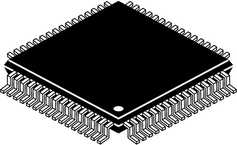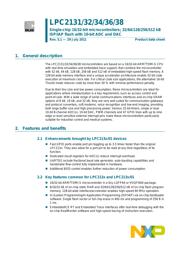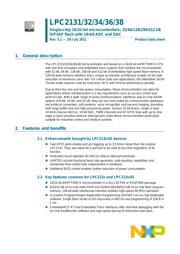●Overview
●The LPC2131/32/34/36/38 microcontrollers are based on a 16/32-bit ARM7TDMI-S CPU with real-time emulation and embedded trace support, that combine the microcontroller with 32 kB, 64 kB, 128 kB, 256 kB and 512 kB of embedded high-speed flash memory. A 128-bit wide memory interface and a unique accelerator architecture enable 32-bit code execution at maximum clock rate. For critical code size applications, the alternative 16-bit Thumb mode reduces code by more than 30 % with minimal performance penalty.
●Due to their tiny size and low power consumption, these microcontrollers are ideal for applications where miniaturization is a key requirement, such as access control and point-of-sale. With a wide range of serial communications interfaces and on-chip SRAM options of 8 kB, 16 kB, and 32 kB, they are very well suited for communication gateways and protocol converters, soft modems, voice recognition and low-end imaging, providing both large buffer size and high processing power. Various 32-bit timers, single or dual 10-bit 8-channel ADC(s), 10-bit DAC, PWM channels and 47 GPIO lines with up to nine edge or level sensitive external interrupt pins make these microcontrollers particularly suitable for industrial control and medical systems.
●MoreLess
●## Features
●2.1 Enhancements brought by LPC213x/01 devices
● Fast GPIO ports enable port pin toggling up to 3.5 times faster than the original LPC213x. They also allow for a port pin to be read at any time regardless of its function.
● Dedicated result registers for ADC(s) reduce interrupt overhead.
● UART0/1 include fractional baud rate generator, auto-bauding capabilities and handshake flow-control fully implemented in hardware.
● Additional BOD control enables further reduction of power consumption.
●2.2 Key features common for LPC213x and LPC213x/01
● 16/32-bit ARM7TDMI-S microcontroller in a tiny LQFP64 or HVQFN64 package.
● 8/16/32 kB of on-chip static RAM and 32/64/128/256/512 kB of on-chip flash program memory. 128-bit wide interface/accelerator enables high-speed 60 MHz operation.
● In-System Programming/In-Application Programming (ISP/IAP) via on-chip bootloader software. Single flash sector or full chip erase in 400 ms and programming of 256 B in 1 ms.
● EmbeddedICE RT and Embedded Trace interfaces offer real-time debugging with the on-chip RealMonitor software and high-speed tracing of instruction execution.
● One (LPC2131/32) or two (LPC2134/36/38) 8-channel 10-bit ADCs provide a total of up to 16 analog inputs, with conversion times as low as 2.44 µs per channel.
● Single 10-bit DAC provides variable analog output (LPC2132/34/36/38).
● Two 32-bit timers/external event counters (with four capture and four compare channels each), PWM unit (six outputs) and watchdog.
● Low power Real-time clock with independent power and dedicated 32 kHz clock input.
● Multiple serial interfaces including two UARTs (16C550), two Fast I²C-bus (400 kbit/s), SPI and SSP with buffering and variable data length capabilities.
● Vectored interrupt controller with configurable priorities and vector addresses.
● Up to forty-seven 5 V tolerant general purpose I/O pins in tiny LQFP64 or HVQFN package.
● Up to nine edge or level sensitive external interrupt pins available.
● 60 MHz maximum CPU clock available from programmable on-chip PLL with settling time of 100 µs.
● On-chip integrated oscillator operates with external crystal in range of 1 MHz to 30 MHz and with external oscillator up to 50 MHz.
● Power saving modes include Idle and Power-down.
● Individual enable/disable of peripheral functions as well as peripheral clock scaling down for additional power optimization.
● Processor wake-up from Power-down mode via external interrupt or BOD.
● Single power supply chip with POR and BOD circuits:
● CPU operating voltage range of 3.0 V to 3.6 V (3.3 V ± 10 %) with 5 V tolerant I/O pads.
●## Features



